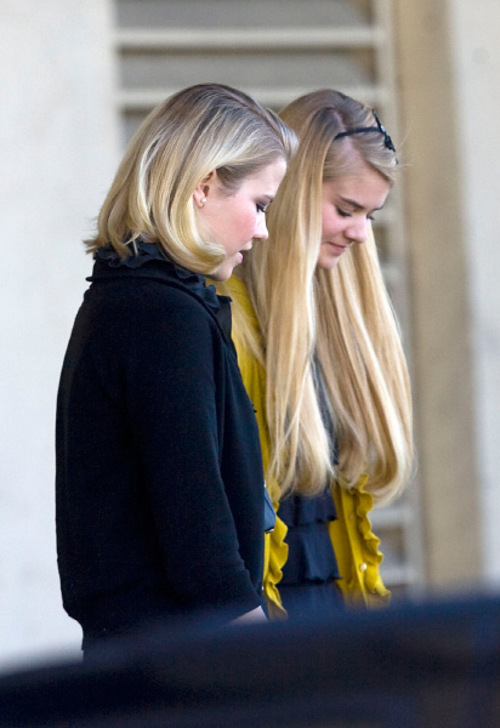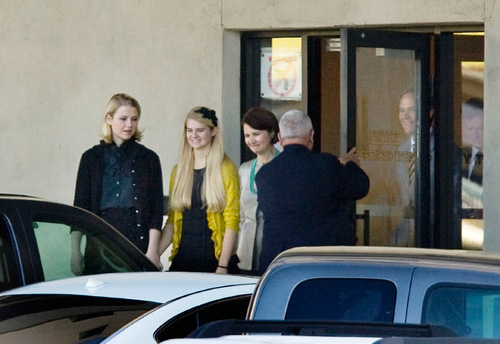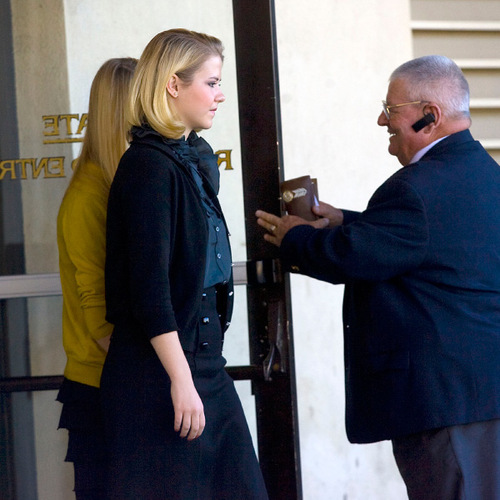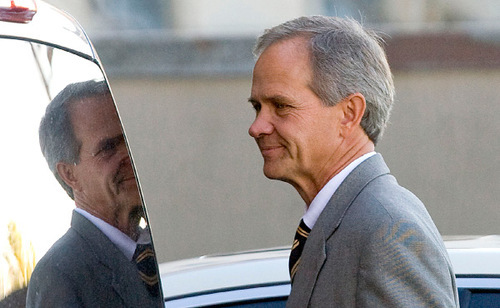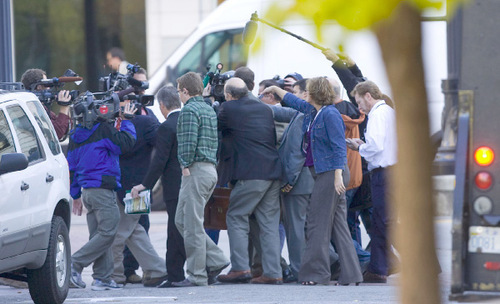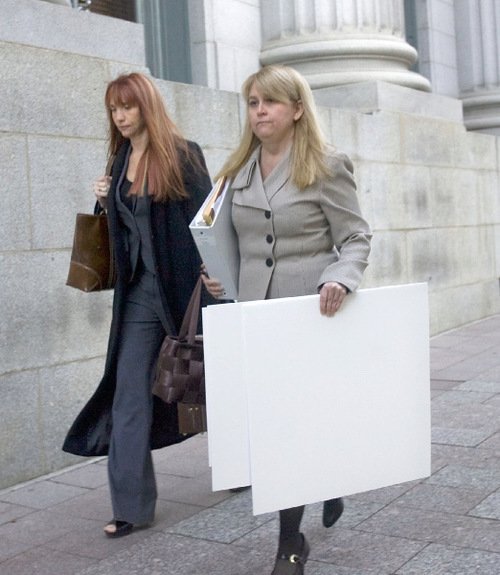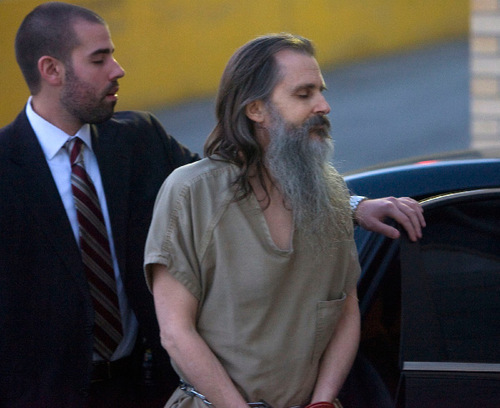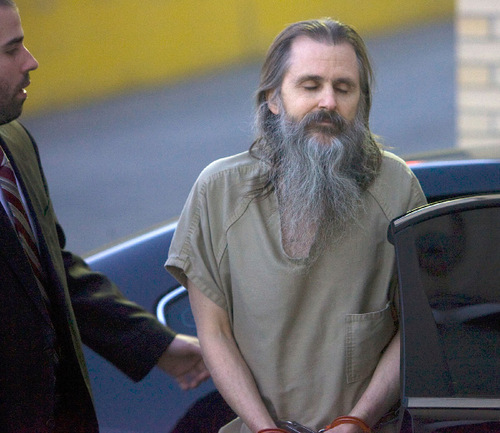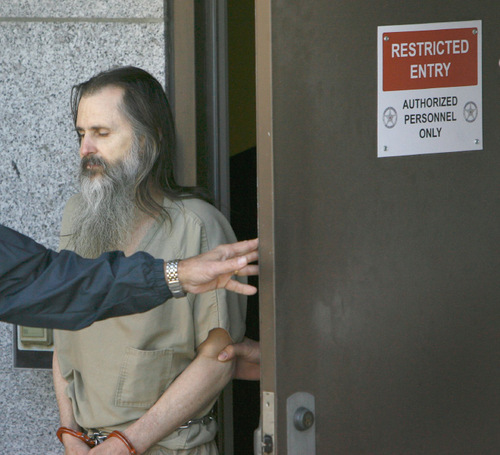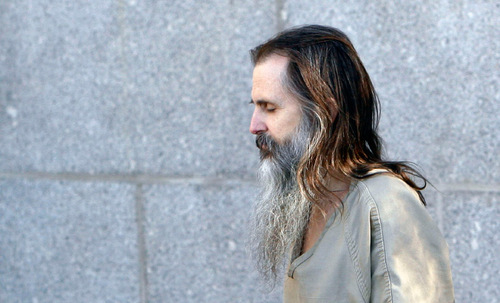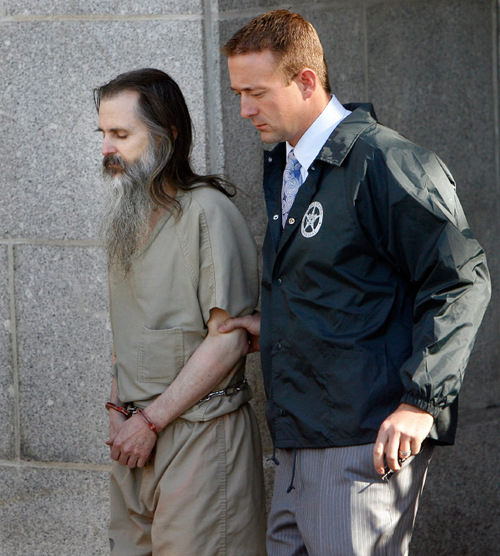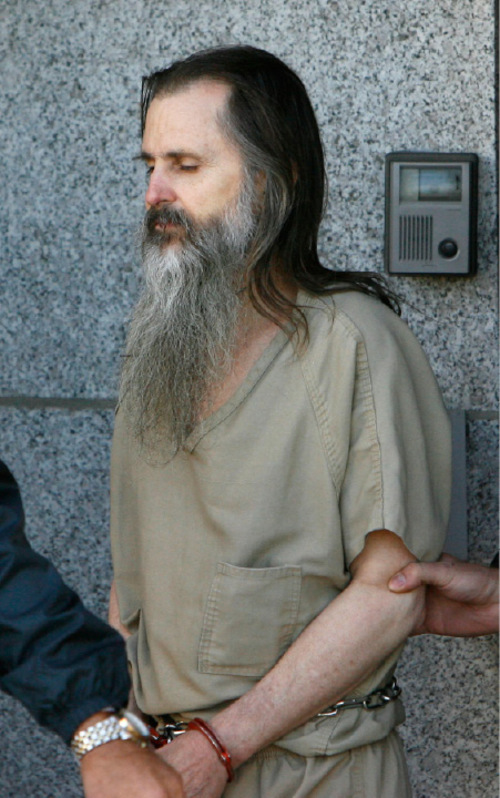This is an archived article that was published on sltrib.com in 2010, and information in the article may be outdated. It is provided only for personal research purposes and may not be reprinted.
Parker Douglas was three minutes into his opening statement Thursday when U.S. District Court Judge Dale Kimball shocked the courtroom by interrupting the defense attorney in midsentence for a private conference with lawyers.
Moments later, Kimball announced to stunned onlookers — including Elizabeth Smart, who raised her eyebrows in surprise and looked at her family seated alongside her — that the 10th U.S. Circuit Court of Appeals had ordered Brian David Mitchell's trial to be halted. The appeals court had decided to weigh defense claims that the jury — seated Thursday to hear the case against the homeless street preacher accused of kidnapping then 14-year-old Smart in 2002 — has already assumed his guilt.
Several legal experts doubted the court would grant the motion, and many called the appeals judges' move extraordinary.
"I have never heard of a case where that's happened," said University of Utah law professor and former federal judge Paul Cassell of the timing. "The fact that they stayed a trial shows they're thinking about it."
Most stays are issued during pretrial proceedings, not after a jury has been seated, he said.
The fact that a jury was seated likely will negate the defense's argument that a panel of fair and impartial jurors couldn't be found in Utah, said lawyer Greg Skordas. He believes the case will go forward in Salt Lake City.
Veteran defense attorney G. Fred Metos agreed.
"If the jury is empaneled and they are starting the trial, it's unlikely they'll interrupt the trial. If there is a real problem with the way the jury was selected, it can be addressed on appeal."
On Thursday afternoon, the 10th Circuit ordered both sides to file briefs stating whether a jury has been empaneled and, if so, whether the request for a stay is moot.
Prosecutors filed their brief just after 10:30 p.m. It states that the jury had been empaneled, but argues Mitchell's petition is moot because the six jurors he identifies as showing "actual bias," were "not actually seated on the jury," and were only part of the panel of 32 from which the jury was selected.
The defense filed its brief about 11:20 p.m. It argued that the Court of Appeals could still stop the trial, despite the jury being seated, and order the case moved to a different venue if it was determined Mitchell could not receive a fair trial in Utah.
"If the district court's legal error in denying Mr. Mitchell's motion for transfer of venue is clear, as the petition shows, then relief by this Court is appropriate," the defense stated in its brief.
The appellate court didn't indicate when it might rule.
"It tells you that the 10th Circuit thinks there's real merit to the issue the defense has raised," said Salt Lake City defense attorney Walter Bugden. "The court must think there's a bona fide issue that must be carefully analyzed."
In his opening statement, Assistant U.S. Attorney Felice Viti recounted for the jury how Smart was kidnapped at knifepoint from her bedroom, taken to the hills behind her home and forced to participate in a ceremony to "marry" her to Mitchell. She was then raped, a nearly daily occurrence for her nine months in captivity before she was found on a Sandy street with Mitchell and his wife, Wanda Barzee.
Douglas then began to tell the jury: "Forgiveness is not for a court of law to provide. ... Courts are about justice. You are here to determine a just result in the facts you are asked to evaluate. In our criminal-justice system, those ..."
With that, Kimball stopped him and requested a private discussion with attorneys. He dismissed the jury for the day and said they may be back next week.
Asked if he was encouraged by the delay, Douglas said, "I don't know that anyone would be encouraged, being stopped in the middle of opening arguments."
Kimball also wasn't keen on the timing.
"I am, of course, very unhappy with this," he told the court. "I have to do what the 10th Circuit says. I don't know what they'll do when they consider [the motion], but for today, we're in recess for this matter. I'm very sorry."
The defense renewed its request for a change of venue after Kimball had selected a pool of 32 prospective jurors Wednesday afternoon. Mitchell's attorneys argue that people who have already decided that Mitchell is guilty were chosen — and that jurors' claims they could set aside their biases weren't enough.
"There are extraordinary cases in which a simple declaration that one can remain unbiased cannot be grounds for finding that a juror will approach their task with the necessary attitude: one which presumes the innocence of the defendant," the writ states. "This is such an extraordinary case, and the District Court erred in failing to recognize it as such."
Of the nine men and five women selected to serve on the jury, all but four said they had heard in the media that Mitchell had kidnapped or been found with Smart.
After the jury pool was selected late Wednesday morning, Kimball expressed confidence in the 32 people he had selected.
"We now know more about these people than any jury I've been involved with in my entire practice and judicial life," Kimball said. "I'm more convinced than ever — with this defendant — you get a fair trial."
Mitchell's defense attorneys disagreed.
"This evidence confirms that the only possible way that the District Court has been able to seat a jury in this venue is by applying the standard as it declared that it would — by discounting the significance of a juror's actual bias as to Mr. Mitchell's guilt," their writ states.
Edward J. Bronson, a jury expert hired by the defense who conducted polls, said the public presumption that Mitchell is guilty (92 percent) is the highest he has ever seen — even higher than in polls conducted in the cases of Oklahoma City bomber Timothy McVeigh (82 percent) and Enron executive Jeffrey Skilling (58 percent).
McVeigh's trial was moved; Skilling's was not. Both were convicted, and McVeigh was executed in 2001.
The court could choose to move the trial to Colorado, Kansas, New Mexico, Oklahoma or Wyoming, which are in the 10th Circuit.
During Mitchell's jury selection, only three of the 46 potential jurors who filled out an extensive questionnaire and were questioned by both the defense and prosecution met the defense's standards. Two made it to the jury.
Six of the jurors in Mitchell's trial had relatives with a mental illness, including depression and bipolar disorder, and three had relatives who were victims of sexual abuse — two at the hands of a family member and one who had an adult family member who was raped. Three said they were more concerned about letting a guilty person go free than imprisoning an innocent one.
The religious makeup was also varied, with seven active members of the Church of Jesus Christ of Latter-day Saints, two inactive LDS Church members, two Catholics, two Presbyterians and one Greek Orthodox Church member.
Bob Ridge, an associate professor of psychology at Brigham Young University, said demographics are too broad to predict how jurors might lean in a case.
Daniel Medwed, a law professor at the University of Utah, agreed.
"It's very hard to generalize about juries because the juror dynamic varies tremendously," he said. "You can't say how they'll interact and who's going to stand out as a leader."
Ken Broda-Bahm, a senior litigation consultant with Persuasion Strategies, which is a service of law firm Holland & Hart, said attitudes and experiences say more about a person than demographics.
Jurors who have a law-and-order mentality are the kind that "make a defense attorney nervous," Broda-Bahm said.
At times, experiences can cut both ways. Someone who was a victim might be harder on victims, thinking they had failed to protect themselves, he said.
"The least useful of all is the demographics," said Broda-Bahm, who is based in Denver, of jurors. "They're not representing a demographic group, they're representing themselves."
Aaron Falk contributed to this report. The jurors
No. 1 (1)* • Female. A registered nurse who now works in marketing said that despite being "conflicted" about finding someone not guilty by reason of insanity, she would "trust in the system" regarding sentencing. She is Catholic.
No. 7 (2) • Female. An Intermountain Healthcare employee who was 16 when Smart disappeared from her home, she said she would rely on the trial evidence despite her belief — based on media reports — that Mitchell kidnapped Smart. She is LDS.
No. 14 (3) • Female. A health care worker who, years ago, worked with sexual-abuse victims, said she could consider an insanity defense but would want to hear from "doctors and family members" on the subject. She is an inactive LDS Church member.
No. 15 (4) • Male. He said he didn't trust the media and attached no significance to Mitchell's singing in court. "It's his decision on how to act or react in certain situations," the man said. He is LDS.
No. 28 (5) • Female. Wrote she believed that Mitchell kidnapped Smart, but said she could set that aside. She is LDS.
No. 32 (6) • Male. Said insanity meant having "no control" over one's actions and that the mentally ill should be sent to a state hospital for treatment. He is an inactive LDS Church member.
No. 33 (7) • Male. Defined insanity as being "disconnected" from normal life. Said he could consider insanity for Mitchell. He is LDS.
No. 34 (8) • Male. Has a family member with a mental illness, but said that wouldn't affect him as a juror. He is an inactive member of the Catholic Church.
No. 37 (9) • Male. Wrote he didn't want to serve because of the high profile of the case but changed his mind. Wrote he'd be more concerned about letting a guilty man go free than jailing an innocent man. He is Greek Orthodox.
No. 39 (10) • Male. Lived in San Jose, Calif., during Smart's abduction. Prosecution said keeping him is "like having a change of venue." He is Presbyterian.
No. 41 (11) • Female. Said she was surprised by Mitchell's singing, but "actually, I don't think he got all the verses correct." She is LDS.
No. 42 (12) • Male. Said he knew almost nothing about the case. Neither side objected to the juror. He is Presbyterian.
No. 44 (13) • Male. Thought people handle stress in different ways, and Mitchell's may be singing: "If that's his way of handling stress, then I don't judge that." He is LDS.
No. 48 (14) • Male. Moved to Utah in 2007. Only heard Smart's name in passing. Neither side objected to him. He is LDS.
*Jurors are listed first by their original juror pool number, followed by their new juror number in parentheses. While 14 jurors are seated, two are alternates, though jurors don't know who the alternates are. —
Online
O To read the entire transcript of the opening arguments already made in Brian David Mitchell's trial, visit .sltrib.com.


